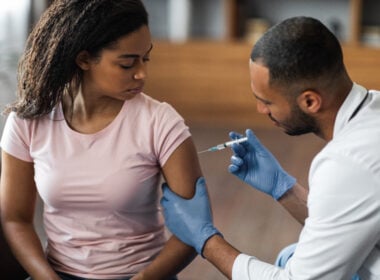Pregnancy, infant, and child loss affect so many families, yet each individual or family’s journey is unique to the person(s) experiencing it, and can be extremely difficult whether the loss occurred very early in pregnancy, later on before birth, or at any age. However, you don’t have to go through it alone. While we’ve discussed healing after miscarriage before here at Natural Womanhood, this article is meant to serve as a resource guide for those who have experienced the loss of a child and are wondering how to start or continue their healing journey. Hopefully your medical provider has been a source of compassion, help, and guidance; the emotional healing resources in this article are aimed at helping you find community and support amongst people who have also experienced miscarriage and other forms of child loss, and can therefore better understand and guide you through your own experience.
In-person support groups & services
Death and grief can feel very isolating. However, child loss is something that many couples have experienced, and it can be helpful to walk this journey with people who, in their own way and through their own experience, understand what you’re going through.
- Share: Share is an organization that provides group therapy and resources for parents who have experienced infant or pregnancy loss. All group sessions are free, and led by other parents who have gone through this experience themselves. There are local Share chapters in 29 states, as well as online support.
- The Compassionate Friends: This organization seeks to provide friendship, understanding, and hope to those going through the grieving process after losing a child (at any age, from any cause) and extends this support to all members of the family (siblings, grandparents, etc.). TCF has local chapters in all 50 states in addition to offering online support.
- Red Bird Ministries: Red Bird is a Catholic ministry that offers local chapters in several states, comfort calls, connecting to spiritual direction, connecting to Catholic therapists, retreats, books, printable resources, and an app. Their mission is to support parents who have lost a child at any age and to partner with parishes to help bring about healing for the individual, marriage, and in a person’s other relationships.
- The Institute for Reproductive Grief Care offers training for healthcare professionals to better support women and couples facing any form of child loss. But they also have excellent resources for those suffering loss as well.
- Finding additional local resources: Aside from national organizations, your city may have local organizations that specialize in loss support and bereavement counseling. For example, in Denver, Colorado, Angel Eyes and Colorado Pregnancy and Newborn Loss Services offer such support. An internet search or reaching out to your medical provider, local pregnancy resource center, or church can help you get in touch with local services that may be available.
Helpful websites and online support
Websites can be a good starting point for finding resources and tips for starting the healing process, especially if you do not yet feel ready to begin in-person support.
- Emotional Healing After a Miscarriage: A Guide for Women, Partners, Family, and Friends: This article created by the Georgetown University School of Nursing discusses self-care and personal healing, the baby and future pregnancies, healing as a couple, and the role of family and friends in the healing process.
- Tommy’s is a UK based organization that researches preterm birth and stillbirth. Their miscarriage support page offers tips, a video series, and a link to a website where people can share and read personal stories of pregnancy loss.
- Catholic Miscarriage Support: This website offers spiritual and emotional tips and information on grief and includes a directory for additional resources such as books, links to online support groups, and information on relevant organizations in different states.
- Walking With You: This is a Facebook group for those who have experienced pregnancy and child loss designed to support and encourage each other in an online community.
- ava’s grace: This is a ministry with local services available in South Bend and Fort Wayne, Indiana that also offers a Zoom-based support group.
- Stitches: This is a new ministry for those who have experienced pregnancy and infant loss with in-person resources that will be available for those in the Atchison, Kansas area and online resources–including a podcast.
- Heaven’s Gain: This Catholic apostolate carries miscarriage kits, burial items such as caskets and urns for babies lost to miscarriage or stillbirth, and pamphlets and brochures for families seeking to provide a respectful burial for their child. The organization’s website also includes sections for medical personnel and funeral directors serving families experiencing perinatal loss.
Books for emotional healing after miscarriage and other forms of child loss
Books can be a good way to start the emotional healing process after miscarriage or other forms of child loss at your own pace and in the comfort of your own home. Reading about other people’s experiences can help you process your own experience and feelings and, again, serve as a reminder that you are not alone.
- A Gift of Time: Continuing Your Pregnancy When Your Baby’s Life is Expected to Be Brief: Although primarily a guide to perinatal hospice, the last two chapters of the book focus on life after the loss of your child.
- Nursery of Heaven: Miscarriage, Stillbirth, and Infant Loss in the Lives of the Saints and Today’s Parents. This book shares the stories of saints who have experienced miscarriage and child loss, testimonies from modern parents, prayers, and practical wisdom for both parents and people looking to support loved ones through the grieving process.
- What God Had Emptied: How I Found Hope in my Children’s Diagnoses (description from the author) A memoir of the two years during which Kathryn Anne Casey became a mother to a medically-complex son, faced another unexpected pregnancy with a fatal prenatal diagnosis and expectantly awaited the birth and death of her daughter. This book illustrates the lesson that when we commit our lives to Christ, he will ask us to walk the way he walked, through the mysterious journey through the cross and hope of resurrection.
- Grieving Together: A Couple’s Journey through Miscarriage: While healing resources are often directed at mothers, fathers suffer a great deal in the wake of miscarriage, too. This book is unique in its focus on how couples can grieve–and heal from–their loss together.
Resources and ideas for remembering your child
Particularly in previous generations, child loss was something kept so quiet that surviving siblings learned of their deceased sibling(s) many years later, if at all. Today, there seems to be a growing trend of finding ways to continue to honor and remember the child in ways that can involve the whole family. Although certainly not exhaustive, some ideas include:
- Birthday celebrations that may involve visiting the gravesite and doing a special activity together as a family
- Remembrance jewelry: Held Your Whole Life offers remembrance jewelry at no cost to grieving parents who have experienced miscarriage. Other ideas include wearing a locket or pendant with a memento such as a photo or footprint (if gestational age allowed).
- Volunteering and activism: Some families are able to find comfort in helping other or future moms by raising money for organizations aimed at preventing miscarriage or stillbirth through research and education such as March of Dimes and Count the Kicks. Other families choose to collect baby items to donate to a local pregnancy resource center or women’s shelter. Another option is to volunteer or to make a donation in honor of their baby to a non-profit or religious order who serves women who are pregnant, such as the Sisters of Life.
- A gift box or care package can be a wonderful thing to send someone who has had a miscarriage, like this one from Our Lady of the Atonement.
- Other beautiful and creative ideas I’ve seen include having a painting commissioned of your whole family–your lost little one included–and finding a Christmas ornament with a certain theme (such as a star or an angel) each year. Finding something that works for your family can help bring a cherished memory or family tradition out of this time of grieving.
Medical resources
While this article has focused primarily on emotional healing after miscarriage, many women and couples long for medical answers after losing a child. Unfortunately, many cases of miscarriage and later forms of child loss may not have any identifiable cause. Many miscarriages are the result of chromosomal abnormalities and do not have anything to do with the mother’s health. However, in some cases, underlying medical conditions can be treated to help achieve a healthy, future pregnancy, and possibly prevent future miscarriages. Some fertility awareness methods can be used alongside restorative reproductive medicine (RRM), which can help women identify a potential root cause of miscarriage.
- FEMM has in-person practitioners in most states and now offers telehealth services for a variety of concerns, including recurrent miscarriage.
- NaPro is the research and application arm of the Creighton Model of fertility awareness, and has trained practitioners in multiple states who specialize in menstrual and fertility care.
- Neo Fertility, based in Ireland, is another practice of restorative reproductive medicine (RRM)-trained healthcare professionals who seek to address the root causes of reproductive issues such as recurrent miscarriage
You’re not alone
Physical and emotional healing from child loss is not a linear, one-size-fits-all process. The circumstances of the loss of your child, your personality, other family members, and many other factors may impact your journey. Wherever you’re at, you have options for furthering that healing a little more today. This might look like joining an online support group or borrowing a book. Perhaps it will look like sharing your story with others, volunteering, or looking for other forms of expression or processing your experience like in music (for example, listening to the song Small Bump by Ed Sheeran). Maybe it will look like trying to get pregnant again quickly, or waiting indefinitely. Whatever your journey looks like, just remember that there is support, and you are not alone.
This article was updated on March 29th, 2023 to include an additional resource.
Additional Reading:
How long should you wait to conceive after miscarriage?
5 ways the medical community can support those who experience miscarriage
What causes stillbirth? What we know (and don’t know)
How to chart your cycle and figure out when you will ovulate after a miscarriage












One Very Important resource that I don’t see mentioned here is Heaven’s Gain (https://heavensgain.org). This beautiful Catholic ministry provides support during the process of pregnancy and neonatal loss, materials and guidance for retaining the child’s remains and offering a dignified funeral and burial, and opportunities for support beyond that point as well.
Thanks for your comment, Andrew! We’re happy to have updated the article to reflect this additional resource.